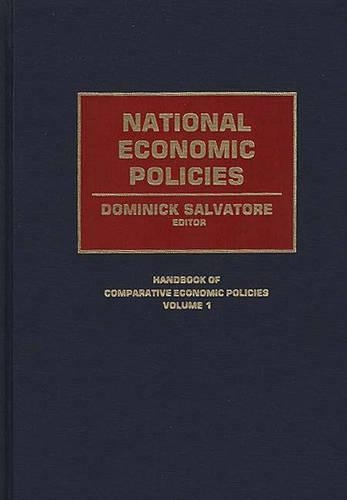
National Economic Policies
(Hardback)
Publishing Details
National Economic Policies
By (Author) Dominick Salvatore
Bloomsbury Publishing PLC
Greenwood Press
30th November 1991
United States
Classifications
Tertiary Education
Non Fiction
Political economy
338.9
Physical Properties
Hardback
416
Description
With increased economic competition among industrial countries, the need for rapid economic development in less developed countries, and the collapse of centrally planned regimes in Eastern Europe, concern for economic policies has moved to the forefront of most nations' agendas. This reference handbook offers and overview of economic policies in the world's most important countries and regions, examining the different mix of methods and tools these governments use to achieve their economic goals. The aim of the volume is to identify and compare the various policies and instruments used by the different countries, as well as the results that have been obtained. The work begins with a brief introduction to national economic policies, written by editor Dominick Salvatore. Separate chapters then focus on each of the major countries--the United States, Japan, India, the Soviet Union, and China--and on several homogeneous groupings of countries, such as the European Economic Community, Latin America, Africa, and Eastern Europe. Economic policies of the past decade and the important changes that have taken place in that period are explained--as well as prospects for the future. Among the major issues discussed are fiscal policies, monetary policies, industrial policies, trade and exchange rate policies, and environmental policies. By considering these various approaches from country to country and by examining the instruments utilized and the outcomes adopted, the book presents a unique comparative study of economic systems. This work will be especially useful to professional economists and policy makers, as well as to students in international economics.
Reviews
The collapse of the Marxist-Leninist regimes in Eastern Europe and the end of the Cold War have moved economic policies into the forefront of discussion and analysis. In most countries, especially in those run by the consent of the governed, top priorities in economic policies include a well-managed economy with high rates of growth and development, full employment, price stability, and concern for the environment. To attain them, governments use fiscal, monetary, income, industrial, regulatory, and trade policies. This volume, the first in a series of comparative economics studies designed to compare and evaluate these policies and their effects is authored by 17 scholars, mostly economists. In the first chapter, the editor provides a general overview of national economic policies. Six chapters are devoted to industrial countries: the US, Japan, India, the now dissolved Soviet Union, China, and Poland. The remaining five chapters deal with economic policies of homogeneous groupings of nations: the European Economic Community, newly industrialized countries, other major OECD (Organization for Economic Cooperation and Development) countries, Latin America, and Africa. This excellently written and documented anthology meets the need for a systematic evaluation of economic policies in this transitionary period toward a global economy. Highly recommended for upper-division undergraduate and graduate students, professionals, and the general public.-Choice
"The collapse of the Marxist-Leninist regimes in Eastern Europe and the end of the Cold War have moved economic policies into the forefront of discussion and analysis. In most countries, especially in those run by the consent of the governed, top priorities in economic policies include a well-managed economy with high rates of growth and development, full employment, price stability, and concern for the environment. To attain them, governments use fiscal, monetary, income, industrial, regulatory, and trade policies. This volume, the first in a series of comparative economics studies designed to compare and evaluate these policies and their effects is authored by 17 scholars, mostly economists. In the first chapter, the editor provides a general overview of national economic policies. Six chapters are devoted to industrial countries: the US, Japan, India, the now dissolved Soviet Union, China, and Poland. The remaining five chapters deal with economic policies of homogeneous groupings of nations: the European Economic Community, newly industrialized countries, other major OECD (Organization for Economic Cooperation and Development) countries, Latin America, and Africa. This excellently written and documented anthology meets the need for a systematic evaluation of economic policies in this transitionary period toward a global economy. Highly recommended for upper-division undergraduate and graduate students, professionals, and the general public."-Choice
Author Bio
DOMINICK SALVATORE is Professor of Economics at Fordham University, a consultant to the United Nations, and the editor of the Greenwood Press series Handbooks of Comparative Economic Policies. He is also the author of more than 20 books, including World Population Trends and Their Impact on Economic Development (Greenwood, 1988). Professor Salvatore is also the editor of the forthcoming handbook National Trade Policies (Greenwood, January 1992).
